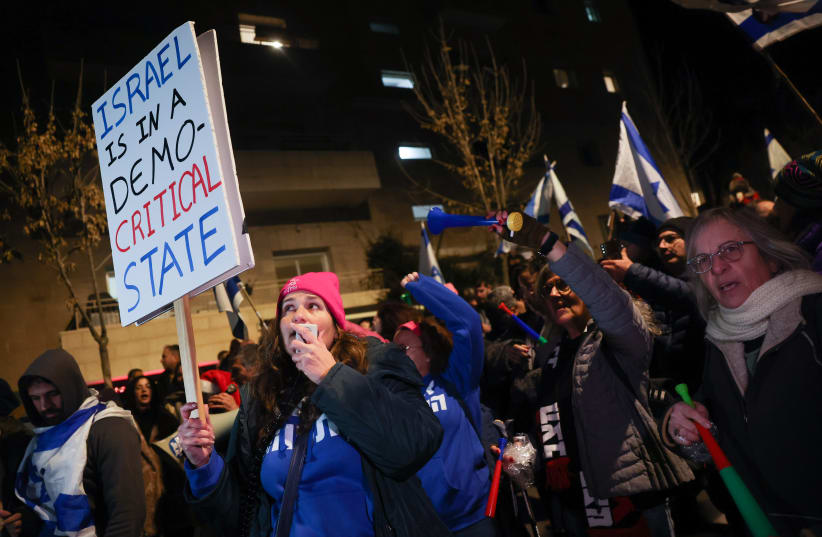Jerusalem was full of noise on Monday.Inside the Knesset, the focal point of the noise was the Constitution, Law and Justice Committee, which voted to send to the Knesset plenum for a first reading next Monday two elements of the fiercely contentious judicial reform package.The noise included opposition MKs singing, “I have no other land,” and chanting, “Shame, shame.” It included the sound of Yesh Atid MK Yorai Lahav Hertzanu’s shoe on a table as he jumped over it and, finger-wagging, approached committee chairman Simcha Rothman.
It included Otzma Yehudit MK Almog Cohen taunting a fellow committee member, using somewhat impolite slang. And it included MKs ejected from the committee meeting, and scuffling with Knesset security officers outside the committee’s doors.And that was inside the parliament.
All cheering for democracy
Outside, there was a lot more noise as tens of thousands protested, many chanting, “De-mo-cracy, De-mo-cracy,” and a few, “Bibi is a traitor, Bibi is a traitor.” One of the speakers, Tel Aviv Mayor Ron Huldai, said in an interview,“Dictatorships go back to being democracies only with bloodshed.”But if one listened carefully, one could also hear amid all of the din, the figurative rustling of leaves on some imaginary trees – the sound of some people moving on branches high in those trees, positioning themselves to start coming down.On Sunday night, in his address to the nation, President Isaac Herzog placed a ladder alongside those trees for those looking for a way down. That “ladder” took the form of a five-point plan for judicial reform that would form the basis of negotiations.Some folks started to move toward that ladder on Sunday night and Monday morning, thereby rustling some of those leaves.Not everyone, and not in one fell swoop. For instance, Herzog called for a halt in the legislative process, an appeal Rothman ignored when he went ahead with the twin votes in his committee. But still, there was some slow movement.Rothman himself made a rustling noise, saying before the meeting that “the gaps that exist between the president’s opening outline and the drafts of the bill I submitted, or the outline presented by [Justice] Minister [Yariv] Levin, are not negligible, but they are not that large either.”Rothman reiterated his opposition to stopping the legislative process, but he said it was possible to hold a dialogue under Herzog’s auspices from now until the law’s first reading in the Knesset, which is expected next Monday. A dialogue can also be held between the first and second readings as well. Rothman called on Supreme Court President Esther Hayut to join the dialogue with representatives of the opposition.Opposition leader Yair Lapid also made a rustling noise in the branches when he responded to Herzog’s speech by saying that the president’s proposal was “worthy” and that his five points should be the basis for negotiations. He added, however, that halting the legislative process was a condition for dialogue.No, the speech did not lead to the type of immediate result Herzog might have hoped for. As a result of Herzog stepping out of the purely ceremonial role of the president and deep into the most divisive moment in Israel since the withdrawal from Gaza in 2005, Rothman did not heed the president’s appeal and call off Monday’s vote in his committee, nor did Lapid call on the organizers of Monday’s protests to call off their demonstrations. No, the speech was not that dramatic, nor was the delivery that powerful.What it did achieve, however, was to get some people to begin loosening up on their all-or-nothing positions and talk about talking.If the sides are willing to talk, why go through with the vote in the Knesset committee on the one hand? Why not freeze the legislative process? And if the sides are willing to talk, why not call off the protests in an effort to create a better atmosphere?
“Dictatorships go back to being democracies only with bloodshed.”
Tel Aviv Mayor Ron Huldai
Why not? Because both sides have a fear of being played.The Right, Levin and Rothman are not going to call off the process out of a fear that if they do, then their moves toward judicial reform will just get buried in committee and nothing will move forward. There is a precedent for this, as proposals in the past by former justice ministers, when faced with vigorous pushback from the judicial establishment, died in committee discussions.Rothman and Levin are keen on setting the ball in motion legislatively, even if they are willing to discuss the proposals under the auspices of Herzog and, ostensibly, make changes in the reform before it comes for a second and third reading. But this time they want to prove that things are different and that they will not let the reform die in committee.And the opposition won’t call off the demonstrations, because the size and intensity of these protests week after week gives them leverage. Would the coalition even consider making the changes the president is proposing in the reforms were it not for the hundreds of thousands of people passionately demonstrating against it?Just as the coalition is not about to freeze the legislative process, because it gives it a gun that it can point at the opposition, the opposition won’t freeze the demonstrations, because it gives it a gun to aim at the coalition.Neither side wants to give up its leverage.The question is whether either side will be willing to negotiate if the other does not give up its leverage.Judging from the events on Monday, the answer would be no. But much of what happened on Monday was political theater, playing to the base, ranting and raving for the protocol, so the protocol will note that one particular MK or politician ranted and raved over this issue – something that could play well when the next elections roll around.But the events that transpired on Monday were planned well before Herzog’s speech. And until that speech, the only game in town was fervent opposition on one side and passionate determination on the other to push this through at all costs.Herzog offered a way down the tree for those looking for one. There are zealots on both sides not interested in a way out. But amid Monday’s cacophony, there were also nascent signs that some were, and this constituted a silver lining in an otherwise gloomy sky.
